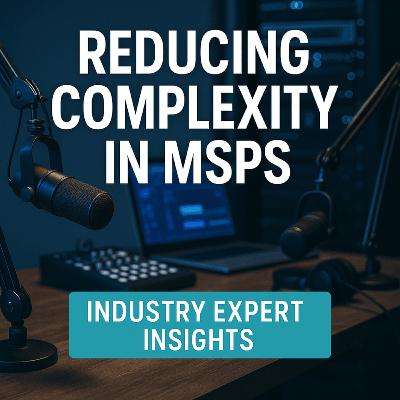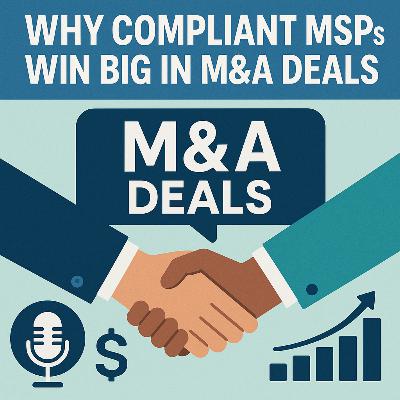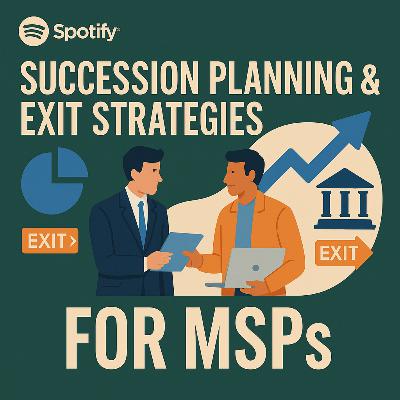Discover The MSP Zone
The MSP Zone

The MSP Zone
Author: Charles Weaver
Subscribed: 26Played: 397Subscribe
Share
© Charles Weaver
Description
Weekly discussion of news, events, and topics of interest to the global managed services professional community. The series will have the latest and most relevant discussions in managed services and cloud computing, featuring special guests and notable figures in the profession.
335 Episodes
Reverse
In this episode, Charles delves into the critical importance of having a clear and compelling message for managed service providers (MSPs). He emphasizes that without a well-defined message, even the best sales tactics can fall short. Charles shares practical steps for MSPs to develop a strong messaging framework that resonates with business decision-makers, ultimately driving revenue and growth. Tune in to learn how to transform your MSP's message from focusing on features to highlighting impactful business outcomes.
In this insightful episode, Charles and Adam Borst explore the current state of the Managed Service Provider (MSP) mergers and acquisitions (M&A) market as we approach 2026. They delve into the dynamics of private equity involvement, the importance of timing, and the strategic considerations for both buyers and sellers. With a focus on international interest and cultural fit, this discussion provides valuable perspectives for anyone navigating the complex world of MSP M&A. Tune in to discover whether the market is cooling and what it means for your business strategy.
Join us for an insightful conversation with Michael George, CEO of Syncro, as we explore the evolving landscape of managed service providers (MSPs). Discover how innovation is reshaping the industry, the role of AI in modern MSPs, and the challenges and opportunities that lie ahead. Michael shares his unique perspective on reducing complexity, enhancing profitability, and the importance of next-generation platforms. Whether you're an industry veteran or new to the MSP world, this episode offers valuable insights into the future of managed services.
Join Charles and Dan Candee, CEO of Cork, as they explore the evolving landscape of Managed Service Providers (MSPs) in today's fast-paced IT world. In this episode, they discuss the shift from traditional IT services to a focus on business resilience and financial outcomes. Discover how MSPs can adapt to remain relevant, the role of cyber insurance, and the importance of engaging in C-suite level conversations. Whether you're an MSP or a business owner, this episode offers valuable insights into navigating the challenges and opportunities in the modern IT environment.
Join us in this insightful episode as we delve into the world of MSP security and compliance. Chris Viau and Charles from MSP Alliance guide us through a year-long journey of mastering cybersecurity awareness, focusing on both technical and non-technical training. Discover practical examples and strategies to implement robust security controls, ensuring your MSP is resilient and prepared for the evolving threat landscape. Whether you're new to cybersecurity or looking to enhance your existing practices, this episode offers valuable insights for all MSPs. Tune in and empower your team with the knowledge to stay secure and compliant.
In this episode, we explore the evolving landscape of Managed Service Providers (MSPs) and the modern-day expectations they face. Join us as we discuss the journey from being a trusted advisor to becoming a key player in the corporate executive suite. We delve into the challenges and opportunities for new and existing MSPs, highlighting the importance of following best practices to thrive in today's competitive environment. Whether you're a startup or an established business, discover why it's never too late to succeed as a competent MSP.
In this episode, we delve into the parallels between the infamous Enron scandal and today's cybersecurity landscape. Join us as we explore whether the cybersecurity industry is on the brink of its own "Enron moment" and what this means for Managed Service Providers (MSPs). We discuss the critical role of MSPs in safeguarding against potential crises, the importance of executive accountability, and the steps necessary to prevent a cybersecurity disaster. Tune in to understand how transparency, compliance, and proactive measures can help us navigate these challenges and secure a resilient future. #Cybersecurity #MSP #Enron
Join Charles Weaver as he sits down with Neil Holme, CEO and founder of Impact Business Technology, to explore the intricacies of managed service provider (MSP) contracts. In this episode, they discuss the ethical considerations and challenges surrounding MSP agreements, including the impact of contractual clauses on customer retention and the balance between business needs and ethical practices. Neil shares his insights on the importance of transparent communication and the evolving landscape of MSP services. Tune in to gain a deeper understanding of how MSPs can navigate these complex issues while maintaining strong customer relationships.
In this episode of MSP Zone, Charles Weaver sits down with Dor Eisner, CEO and co-founder of Guardz, to explore the evolving landscape of cybersecurity. They delve into the critical role of identity access management as the new frontier for cyber threats, the challenges faced by MSPs in adapting to these changes, and the transformative potential of AI in managed services. Discover how small and medium-sized businesses can navigate these complexities and why embracing innovative security solutions is essential for future success.
Join Charles Weaver as he delves into the evolving landscape of Managed Service Providers (MSPs). In this episode, Charles discusses the pressing need for MSPs to mature and adapt, highlighting the challenges of low profit margins and the importance of certification. He shares insights from recent industry events, exploring themes like artificial intelligence, compliance, and succession planning. Tune in to discover how MSPs can bridge the gap to scalability and profitability, and why the time has come for a new era in managed services.
In this episode, Charles Weaver delves into the age-old dilemma of competing against Managed Service Providers (MSPs) that drive down pricing. He explores the challenges of negotiating with prospects who are tempted by cheaper alternatives and offers practical advice on how to maintain your value without succumbing to a race to the bottom. Charles shares insights on establishing credibility, educating customers, and the importance of standing firm on pricing to ensure long-term success. Tune in to learn how to position your MSP practice for optimal success in a competitive market.
In this insightful episode, Charles Weaver explores why profitability is crucial for Managed Service Providers (MSPs) and Managed Security Service Providers (MSSPs). Delve into the financial metrics that define success in the industry and learn how maintaining healthy profit margins ensures sustainability and growth. Charles discusses the challenges faced by service providers and offers strategies to enhance profitability, emphasizing the role of efficient service delivery and strategic planning. Join us to understand how profitability impacts the long-term viability and effectiveness of MSP and MSSP practices.
In this episode, we delve into the critical topics of managed services immunity and safe harbor laws for Managed Service Providers (MSPs). Discover how these legal frameworks protect MSPs from certain liabilities, ensuring a safer operational environment. Join us as we explore real-world examples and expert insights, shedding light on how these laws impact the industry and what MSPs need to know to stay compliant and secure.
This conversation delves into the size and growth of the managed services market, highlighting the disparity between the number of service providers and the actual maturity and capability of these providers. Charles Weaver discusses the financial metrics of the managed services industry, the challenges in defining what constitutes an MSP, and the implications of these factors on the future of the market. He emphasizes the need for more transparency and certification among MSPs to meet the growing demand for managed services, particularly in light of emerging technologies like AI and increasing cybersecurity threats.
In this episode, we delve into the critical strategies Managed Service Providers (MSPs) can employ to avoid litigation. Charles Weaver shares insights on the common pitfalls that lead to legal disputes and offers practical advice on implementing best practices, securing robust contracts, and maintaining comprehensive insurance. Discover how to safeguard your MSP business by understanding the three pillars of risk mitigation and learn from real-world scenarios to enhance your operational resilience. Tune in to ensure your MSP is prepared to navigate the complexities of today's legal landscape.
Join Charles Weaver as he delves into the emerging world of cyber VARs and their transformative impact on managed services. Discover how these value-added resellers are reshaping the IT landscape, challenging traditional models, and offering new opportunities for MSPs. Whether you're an industry veteran or new to the field, this episode provides valuable insights into the evolving dynamics of cybersecurity and IT services. Tune in to explore the future of managed services and the role of cyber VARs in driving change.
This episode focuses on the importance of shifting away from reactive IT and growing proactive IT services. Charles Weaver emphasizes that striving for perfection in managed services not only enhances profitability but also leads to greater customer satisfaction and team happiness. He contrasts the MSP model with break-fix companies, highlighting the benefits of a proactive approach in service delivery.
In this podcast, Charles Weaver and Kyle Murphy discuss the critical differences between MSP benchmarking and peer groups, emphasizing their unique roles in the growth and success of managed service providers. They explore the importance of peer groups for MSPs at all stages, the value of benchmarking beyond financial metrics, and the benefits of learning from both larger and smaller MSPs. The conversation also highlights the significance of diversifying peer group memberships and setting actionable goals for continuous improvement.
In this episode, we delve into the critical importance of compliance in the Managed Service Provider (MSP) world, especially during mergers and acquisitions (M&A). We explore why proof of compliance is essential and how, without concrete evidence, any claims of compliance are rendered invalid. Listeners will gain insights into the necessity of a clear understanding of compliance fundamentals in M&A processes. We discuss the role of auditors who require solid evidence to validate compliance efforts and emphasize the importance of maintaining proper documentation to support these claims. We also highlight the crucial distinction between merely assimilating information and actually proving compliance. Evidence must be readily available for audits, as compliance is not just about following processes but also about achieving demonstrable outcomes. Understanding these fundamentals can significantly aid in successful M&A, and effective compliance practices can greatly enhance a company's credibility. Tune in to learn how to navigate these complexities and ensure your compliance efforts are both robust and verifiable.
In this insightful podcast episode, Charles Weaver delves into the evolving landscape for Managed Service Providers (MSPs) with a focus on succession planning and exit strategies. The conversation covers a range of topics crucial for MSP owners, including the diverse options available for exiting the business and the various types of buyers in the market.Charles Weaver highlights the importance of understanding buyer motivations and the need for MSP owners to carefully consider partner dynamics and internal succession strategies. He also discusses the valuation process, providing valuable insights into how MSPs can determine the worth of their business.The episode concludes with practical advice on controlling the sale process and making informed decisions, ensuring that MSP owners are well-prepared for a successful transition. This conversation is a must-listen for anyone involved in the MSP industry, offering expert guidance on navigating the complexities of succession planning and exit strategies.









